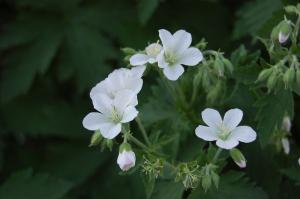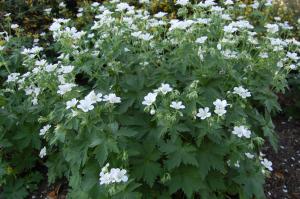
Geranium sylvaticum ‘Album’ flower (22/04/2011, Kew Gardens, London)
Position: Full sun to shade.
Soil: Moist, well drained.
Flowering period: Late spring and early summer.
Eventual Height: 70cm
Eventual Spread: 20cm
Hardiness: USDA Zone 3a-9a
Family: Geraniaceae
Geranium sylvaticum ‘Album’ is a herbaceous perennial with a bushy, clump forming habit. Its pale green, basal leaves are deeply divided by lobed segments and it bears pure white, saucer shaped flowers that are tinged pink when they open.
The species Geranium sylvaticum, commonly known as the Woodland Geranium or the Wood Cranesbill, is native to much of Asia and Europe including England.
Geranium is derived from the Greek geranos, meaning ‘crane’ referring to the beak-like fruit, with sylvaticum being derived from the Latin silvi meaning ‘forest’ and translating as ‘of the forest’. ‘Album’ is Latin for a ‘writing tablet’ now used to mean ‘white’ in reference to the tablets historically being white.

Geranium sylvaticum ‘Album’ (22/04/2011, Kew Gardens, London)
The landscape architect may find Geranium sylvaticum ’Album’ is useful as an effective ground cover plant that will tolerate the dappled shade of a woodland setting. Consideration must be given to its placement as this species is not evergreen and will leave ‘bare soil’ in the winter months.
Geranium sylvaticum ‘Album’ will tolerate a wide pH range so long as the soil is free draining and will thrive in either an exposed or sheltered location with any aspect.
Ecologically, Geranium sylvaticum ‘Album’ will attract pollinating insects such as bees that will feed on its nectar.
The Royal Horticultural Society have given Geranium sylvaticum ‘Album’ their prestigious Award of Garden Merit.
Geranium sylvaticum ’Album’ can be cut back hard to after flowering to rejuvenate the foliage. If the clumps become too large they can be divided in March, April or May.

